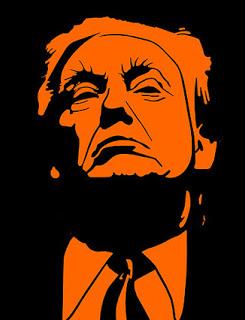 (Caricature of Donald Trump is by DonkeyHotey.)
(Caricature of Donald Trump is by DonkeyHotey.)When he campaigned for office, Donald Trump posed as a friend of working people -- and many started to call him a "populist" because of that. But it was just another one of his many lies. After assuming office, he has done nothing to help make life easier for working people. In fact, his policies have been aimed at helping the rich -- to the detriment of people who actually work for a living.
Here's what Nobel Prize-winning economist Paul Krugman has to say about this in his New York Times column:
Message to those in the news media who keep calling Donald Trump a “populist”: I do not think that word means what you think it means. It’s true that Trump still, on occasion, poses as someone who champions the interests of ordinary working Americans against those of the elite. And I guess there’s a sense in which his embrace of white nationalism gives voice to ordinary Americans who share his racism but have felt unable to air their prejudice in public. But he’s been in office for a year and a half, time enough to be judged on what he does, not what he says. And his administration has been relentlessly anti-worker on every front. Trump is about as populist as he is godly — that is, not at all. Start with tax policy, where Trump’s major legislative achievement is a tax cut that mainly benefits corporations — whose tax payments have fallen off a cliff — and has done nothing at all to raise wages. The tax plan does so little for ordinary Americans that Republicans have stopped campaigning on it. Yet the administration is floating the (probably illegal) idea of using executive action to cut taxes on the rich by an extra $100 billion.
There’s also health policy, where Trump, having failed to repeal Obamacare — which would have been a huge blow to working families — has engaged instead in a campaign of sabotage that has probably raised premiums by almost 20 percent relative to what they would have been otherwise. Inevitably, the burden of these higher premiums falls most heavily on families earning just a bit too much to be eligible for subsidies, that is, the upper part of the working class.
And then there’s labor policy, where the Trump administration has moved on multiple fronts to do away with regulations that had protected workers from exploitation, injury and more. But immediate policy doesn’t tell the whole story. You also want to look at Trump’s appointments. When it comes to policies that affect workers, Trump has created a team of cronies: Almost every important position has gone to a lobbyist or someone with strong financial connections to industry. Labor interests have received no representation at all. And the nomination of Brett Kavanaugh for the Supreme Court deserves special attention. There’s a lot we don’t know about Kavanaugh, partly because Senate Republicans are blocking Democratic requests for more information. But we do know he’s starkly, extremely, anti-labor — way to the right of the mainstream, and well to the right even of most Republicans. . . . Anyway, whatever his motivations, Trump in action is the opposite of populist. And no, his trade war doesn’t change that judgment. William McKinley, the quintessential Gilded Age president who defeated a populist challenger, was also a protectionist. Furthermore, the Trumpian trade war is being carried out in a way that produces maximum harm to U.S. workers in return for minimum benefits. While he isn’t a populist, however, Trump is a pathological liar, the most dishonest man ever to hold high office in America. And his claim to stand with working Americans is one of his biggest lies. Which brings me back to media use of the term “populist.” When you describe Trump using that word, you are in effect complicit in his lie — especially when you do it in the context of supposedly objective reporting. And you don’t have to do this. You can describe what Trump is doing without using words that give him credit where it isn’t due. He’s scamming his supporters; you don’t have to help him do it.
